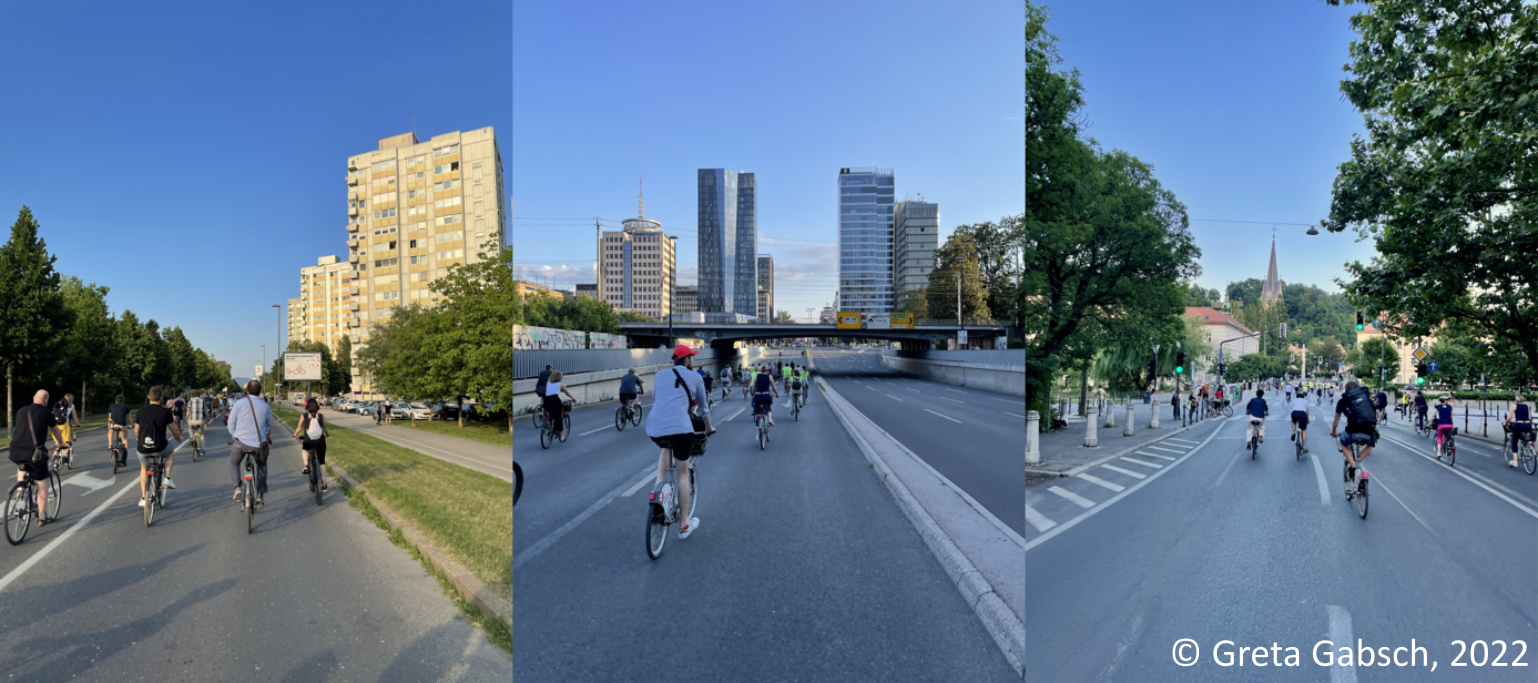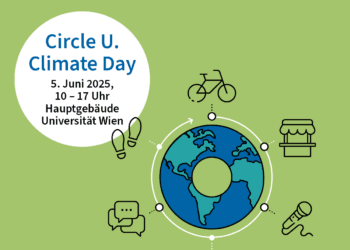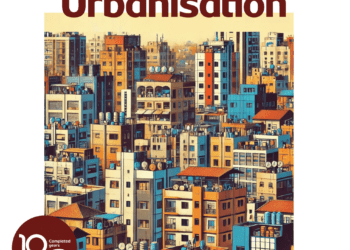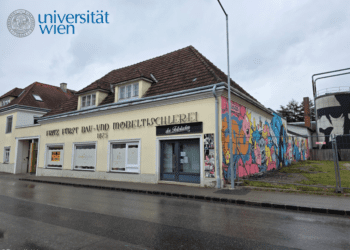Contribution by David Hees, Arthur Klingl and Greta Gabsch
Cycling as the mobility form of the future? Where does this vision come from and how can it be realized? Three students of the master’s program 4CITIES report on their impressions at the Velo-City conference in Ljubljana from June 14 to 17, 2022.
Since 1980, the Velo-City conference has been held every year in a different city around the world. It is one of the largest mobility fairs in the world and is also one of the largest event projects of the European Cyclists’ Federation (ECF). Every year, bicycle advocates, city representatives, decision-makers, academics, researchers and industry leaders come together to shape the future of cycling. The vision that unites them all is to promote cycling worldwide as a sustainable and healthy form of mobility. Ljubljana, in the heart of Slovenia, was chosen as the venue for this year’s conference. Not without reason, as the city has undergone an impressive transformation to a bicycle-friendly city in recent years.
Through the newsletter of the Department of Spatial Planning at the Vienna University of Technology we learned about the possibility to win tickets for this conference with the support of klimaaktiv mobil. Why not give it a try – we thought to ourselves, but considered the chances of winning the tickets to be very slim. As a competition entry, three of us wrote an idea paper on what our ideal more bicycle-friendly city could look like. The basis for this was our accumulated experience from the Spring School held for the first time this year as part of our 4CITIES master’s degree program (read more here). In the end, our ideas were convincing and the commitment for three conference tickets came a few days later.
For us, this was to be the first conference experience with a professional focus. Although we had already received a lot of information in advance, we could not quite imagine the schedule, the different formats and the entire atmosphere. All the greater was our anticipation of the four-day conference. The conference started with some welcome speeches, among others by the mayor of Ljubljana, and also an exciting panel discussion, in which the well-known architect and urban planner Jan Gehl took part. His quote „Can bicycle activism save the world? Yes, I‘ve seen it done and I‘ve seen wonderful results for the world“ inspired everyone and provided an optimistic start to the conference days. In between these large discussion panels at the beginning and end of each day, various smaller presentations and discussions took place in parallel. Each day focused on a different topic, including “Rethinking Urban Space,” “Citizens, Stakeholders and Community,” “Policies for more Cycling,” and several others. For those who want to learn more about the diverse content and presentations, most of the presentations can also be found online here. There was also an extensive exhibition throughout the main hall where organizations, cities and companies showcased their projects.
One of the greatest aspects of the entire time was the diversity of participants. Not only did they come from all corners of the world – from Brazil to Taiwan – but they were at very different stages of their careers and thus in different age groups. For example, not only the Chairman and CEO of JCDecaux (one of the largest outdoor advertising companies in the world, which, among other things, implements rental bike systems in cities as public-private partnerships) presented and discussed, but also a young Finnish university graduate who presented the results of her master’s thesis. These very different perspectives not only enriched the content of the thematic blocks, but also ensured that aspects relevant to young and old were addressed.
After these exciting first days, the first highlight of the conference was just around the corner: the big bike parade. This started directly in front of the doors of the conference site and led once through the very different corners of the city. Many hundreds of participants of the conference took part, but also residents of the city of Ljubljana. Together they tested (for some for the first time) the partly brand new bicycle infrastructure of the city, enjoyed the sunset and together caused some surprised faces among car drivers.
The second highlight was the big networking dinner in the courtyard of the castle above the houses of the city. After initial rain, however, the weather and the mood improved. Until then, we were under the assumption that we did not know any of the participants. We were proven wrong when we ate at a table with four Brazilian women, who turned out to be former work colleagues of one of our fellow students. Thus began the networking that evening. Another special surprise that evening was the presentation of the ECF Award for Road Safety, which this year went to the City of Brussels. Last year, the city contributed to a 50 percent reduction in traffic fatalities by introducing a general 30 km/h speed limit. Why was this a special surprise for us? As part of our master’s degree, we all spent the first semester together in Brussels and also gained our cycling experience together there (which we are now somewhat regretting in our semester in Vienna). So, at this point, greetings and congratulations to Brussels!
What did we take away from this intensive first conference, in terms of content as well as personally? An incredible amount, so much that it cannot be summarized here. Nevertheless, we would like to briefly list some important insights:
- Every city and every country is at a very different level in terms of mobility needs and reality, so there are very different paths for change.
- Actions for a real transformation need to include the following three aspects: technical features (bikes), cycling infrastructure and the culture of cycling.
- Mobility is also a question of equity: how much money and space is allocated to bicycle mobility compared to other modes?
- Another quote from Jan Gehl: “Bicycling is sometimes about traffic from A to B. But it is always about people.”
- For change, obstacles should be taken as a positive starting point
- Bicycling should be fun for everyone
- To change people’s behavior, they first need to understand what they think and why they think that way, and need to realize that they can change their behavior and the benefits of doing so.
- It is important to explain to people that they do not have to wait for the government to do something, but that they can also use their own means if the government does not do anything
- To make urban transport better and safer, electric cars are not a sole solution, as they are still dangerous & and harmful too
Overall, we got the feeling in the four days that there is hope. People around the world are trying to change the current status quo of urban design and do something good for the planet and people. We are excited to see what topics and ideas will be in focus at the next Velo-city conference in Leipzig in 2023.






